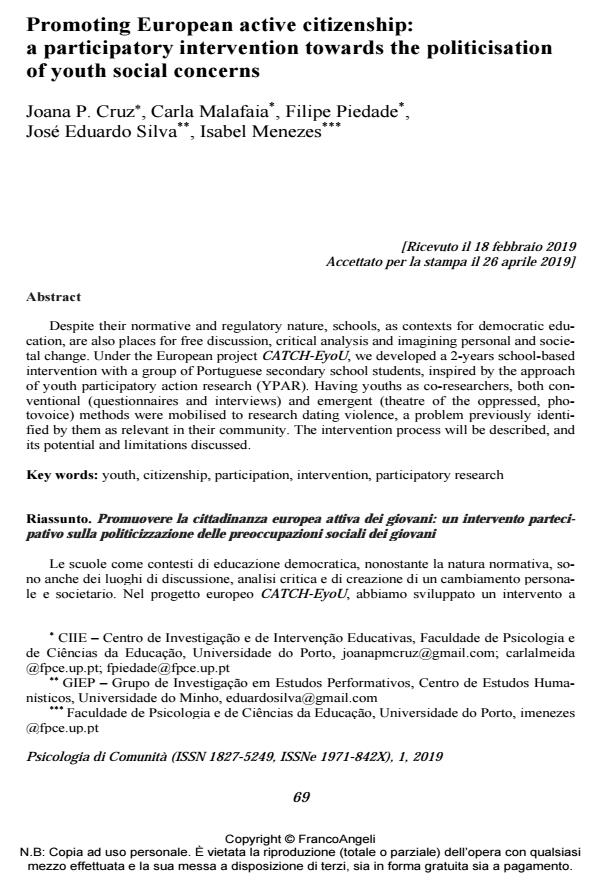Promoting European active citizenship: a participatory intervention towards the politicisation of youth social concerns
Titolo Rivista PSICOLOGIA DI COMUNITA’
Autori/Curatori Joana P. Cruz, Carla Malafaia, Filipe Piedade, José Eduardo Silva, Isabel Menezes
Anno di pubblicazione 2019 Fascicolo 2019/1
Lingua Inglese Numero pagine 21 P. 69-89 Dimensione file 231 KB
DOI 10.3280/PSC2019-001006
Il DOI è il codice a barre della proprietà intellettuale: per saperne di più
clicca qui
Qui sotto puoi vedere in anteprima la prima pagina di questo articolo.
Se questo articolo ti interessa, lo puoi acquistare (e scaricare in formato pdf) seguendo le facili indicazioni per acquistare il download credit. Acquista Download Credits per scaricare questo Articolo in formato PDF

FrancoAngeli è membro della Publishers International Linking Association, Inc (PILA), associazione indipendente e non profit per facilitare (attraverso i servizi tecnologici implementati da CrossRef.org) l’accesso degli studiosi ai contenuti digitali nelle pubblicazioni professionali e scientifiche.
Despite their normative and regulatory nature, schools, as contexts for democratic educa-tion, are also places for free discussion, critical analysis and imagining personal and societal change. Under the European project CATCH-EyoU, we developed a 2-years school-based in-tervention with a group of Portuguese secondary school students, inspired by the approach of youth participatory action research (YPAR). Having youths as co-researchers, both conven-tional (questionnaires and interviews) and emergent (theatre of the oppressed, photovoice) methods were mobilised to research dating violence, a problem previously identified by them as relevant in their community. The intervention process will be described, and its potential and limitations discussed.
Le scuole come contesti di educazione democratica, nonostante la natura normativa, sono anche dei luoghi di discussione, analisi critica e di creazione di un cambiamento personale e societario. Nel progetto europeo CATCH-EyoU, abbiamo sviluppato un intervento a scuola della durata di due anni con un gruppo di studenti portoghesi della scuola secondaria, ispirato all’approccio della ricerca azione partecipata con i giovani (YPAR). Considerando i giovani come co-ricercatori, metodi convenzionali (questionari e interviste) ed emergenti (teatro dell’oppresso e photovoice) sono stati usati per indagare la violenza nelle relazioni tra pari, un problema precedentemente identificato dai giovani come rilevante nella propria comuni-tà. L’articolo descrive il processo dell’intervento, e ne discute potenzialità e limiti.
Parole chiave:Giovani, cittadinanza, partecipazione, intervento, ricerca partecipata
- Becoming activists: how young athletes use visual tools for civic action and meaning-making within participatory research Daniel Vieira, Teresa Silva Dias, Marta Sampaio, Sofia Castanheira Pais, Norberto Ribeiro, Cosmin Nada, Carla Malafaia, in Frontiers in Political Science 1414795/2024
DOI: 10.3389/fpos.2024.1414795 - Promoting Environmental Citizenship Using Participatory School-Based Community Profiling on Water (Mis)uses Diogo Filipe Prada da Silva, Joel Bruno da Silva, Marta Oliveira Barbosa, Norberto Ribeiro, Isabel Menezes, in ECNU Review of Education /2025 pp.79
DOI: 10.1177/20965311241264829
Joana P. Cruz, Carla Malafaia, Filipe Piedade, José Eduardo Silva, Isabel Menezes, Promoting European active citizenship: a participatory intervention towards the politicisation of youth social concerns in "PSICOLOGIA DI COMUNITA’" 1/2019, pp 69-89, DOI: 10.3280/PSC2019-001006